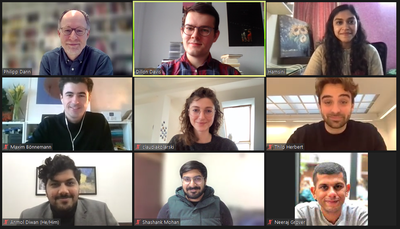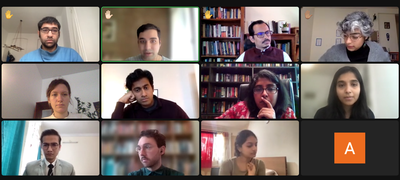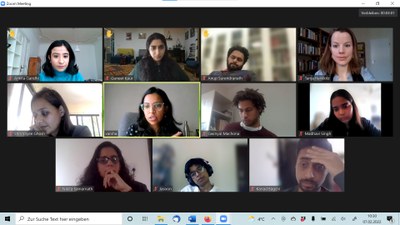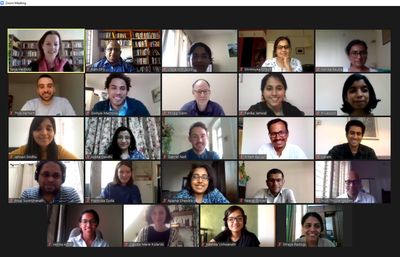'Legal Cultures in India and Europe' and 'Law and Transformation'
The Chair for Public and Comparative Law supports two collaborative Indo-German projects, which are being generously funded by the DAAD through its programmes 'A New Passage to India' and 'Indo-German Partnerships'.Both projects aim to offer students, doctoral candidates, and researchers the opportunity to participate in an exchange programme as well as joint workshops and build on long-standing cooperation between the Chair and
four Indian universities.
The four participating institutions – Humboldt-University Berlin, Azim Premji University (APU) in Bangalore, National Law University Delhi (NLUD) and Jindal Global Law School (JGLS) – have set up an exchange programme that invites Indian students, PhD candidates and lecturers to Humboldt-University and that enables students and PhD candidates from Humboldt-University to travel to India for study and research stints at one of our Indian partner institutions. In addition, doctoral workshops are held annually at one of the four participating universities. The project further attempts to develop joint teaching modules on comparative law with a focus on Indian, German and European law and legal cultures.
When set up in 2019, this was arguably the most comprehensive exchange project for students and researchers in law between German and Indian law schools. Today it is accompanied by another German-Indian collaboration, which is also based at the Chair for Public and Comparative Law at Humboldt-University and which is likewise funded by the DAAD: the Law and Transformation Project.
In its interdisciplinary and comparative examination of the law in India, Germany and Europe, the project allows for a focus on very different areas of law - from business law, competition and regulatory law, environmental law to questions of democracy, federalism and human rights.
The project aims to encourage legal scholars to leave the traditional academic paths by looking at legal systems beyond the usual suspects. For German researchers this means leaving Eurocentricism behind and turning their attention to India and more broadly to the Global South. Indian academics are encouraged to consider not only the USA and other Commonwealth countries as objects of legal comparison and as places for potential research and study visits, but to see German and European law as an interesting field of research. The project further seeks to produce innovative research through its interdisciplinary approach and a transnational dialogue. We encourage German and Indian researchers to not only deal with the respective foreign legal system but to also reflect critically on their own legal system.
To achieve these goals, the project is based on three central pillars. On the one hand, exchange projects for students, doctoral candidates, postdocs and teachers between Berlin and Bangalore are organised on a regular basis. Secondly, the project plans to expand the range of courses on Indian law at Humboldt-University. Thirdly, ‘young scholars workshops’ offer doctoral and post-doctoral researchers an opportunity to present and discuss their comparative research projects among an interdisciplinary German-Indian audience.
The project is coordinated by Dr. Tanja Herklotz and Valentin Weigel. They are being supported by the student assistants Dillon Davis and Danae Zolotas.
News & Events
Call for Contributions - "Casting Light on Kashmir"
We invite potential contributors to send us abstracts for a blog symposium on Verfassungsblog and a Special Issue of World Comparative Law (WCL). Abstracts are due on 30 July 2022. The Call is available here.
Past Events
Third Young Scholars’ Workshop
In February 2022, the Chair of Public and Comparative Law, together with its four Indian partner universities, the National Law School of India University, Jindal Global Law School, Azim Premji University, and National Law University Delhi, hosted the third of four annual Young Scholar's Workshops. Due to the ongoing Covid-19 pandemic, this year's workshop once again took place digitally over the course of two days. The workshop offered doctoral students a platform to present their projects and receive constructive feedback on content and methodology from 22 participating doctoral students and ten professors and postdoctoral researchers. Among other issues, the participants discussed Comparative and International Law, Legal Doctrine and Philosophy, and Interdisciplinary Legal Studies. Special thanks go to the external commentators as well as Professor Chandra, Professor Dann and Dr. Herklotz for moderating the three thematic clusters.

 Group 2 "Legal Doctrine and Philosophy" Participants: Professor Dr. Aparna Chandra (NLSIU), Saifuddin Patel (JGLS), Vikram Narayan (HU), Radhika Chitkara (NLSIU), Ira Chadha-Sridhar (Cambridge), Gabriel Noll (HU), Dr. Gautam Bhatia (Oxford/SCRIPTS), Jahnavi Sindhu (HU), Professor Dr. Pritam Baruah (BML Munjal), Professor Dr. Arun K. Thiruvengadam (NLSIU), Dr. Amal Sethi (Hamburg), Professor Dr. Sitharamam Kakarala (APU)
Group 2 "Legal Doctrine and Philosophy" Participants: Professor Dr. Aparna Chandra (NLSIU), Saifuddin Patel (JGLS), Vikram Narayan (HU), Radhika Chitkara (NLSIU), Ira Chadha-Sridhar (Cambridge), Gabriel Noll (HU), Dr. Gautam Bhatia (Oxford/SCRIPTS), Jahnavi Sindhu (HU), Professor Dr. Pritam Baruah (BML Munjal), Professor Dr. Arun K. Thiruvengadam (NLSIU), Dr. Amal Sethi (Hamburg), Professor Dr. Sitharamam Kakarala (APU) Group 3 "Interdisciplinary Legal Studies" Participants: Dr. Tanja Herklotz (HU), Varsha Aithala (APU), Gwinyai Machona (HU), Jasoon Chelat (NLSIU), Ankita Gandhi (HU), Nikita Samarnath (NLUD), Guneet Kaur (HU), Madhavi Singh (NLSIU), Kanad Bagchi (MPIL), Professor Dr. Anup Surendranath (NLUD), Dr. Shrimoyee Ghosh (APU)
Group 3 "Interdisciplinary Legal Studies" Participants: Dr. Tanja Herklotz (HU), Varsha Aithala (APU), Gwinyai Machona (HU), Jasoon Chelat (NLSIU), Ankita Gandhi (HU), Nikita Samarnath (NLUD), Guneet Kaur (HU), Madhavi Singh (NLSIU), Kanad Bagchi (MPIL), Professor Dr. Anup Surendranath (NLUD), Dr. Shrimoyee Ghosh (APU)
Digital student exchange 2021 with Indian partner universities:
This summer semester, the Chair of Public Law and Comparative Law has organized a digital student exchange program together with the National Law University Delhi (NLUD) and the National Law School of India University (NLSIU) Bangalore for the first time. Selected students from the participating universities engaged in a seminar on comparative constitutional law specially designed for the program, led by Prof. Dr. Philipp Dann and Prof. Dr. Aparna Chandra, with a focus on the comparison between Indian and German constitutional law. If the situation allows, the participants of the program can travel to Delhi / Bangalore, respectively Berlin in the second half of the year.
Two German participants have written a report on the seminar, which you can read here. Please be aware that the report is written in German.
 Second Young Scholar's Workshop
Second Young Scholar's Workshop
In February 2021, the Chair of Public and Comparative Law, together with its four Indian partner universities, the National Law School of India University, Jindal Global Law School, Azim Premji University, and National Law University Delhi, hosted the second of a total of four annual Young Scholar's Workshops. Due to the Corona Pandemic, this year's workshop was held digitally over a total of six days. The workshop offered doctoral students a platform to present their related projects and receive feedback on content and methodology from the 17 participating doctoral students and nine professors and postdoctoral researchers. In addition, the doctoral students participated in skills sessions on topics such as working on a long term academic project, publishing academic work, building networks and being productive in times of a pandemic. The workshop also provided a platform to exchange experiences and build new academic networks. You can find a detailed workshop report of two participants here.
Study and research stays in India 2020: In February and March 2020 five students and one doctoral candidate from the law faculty of the Humboldt University of Berlin traveled to India for a study and research stay at the Jindal Global Law School in Sonipat (India). Our scholarship holders have recorded their experiences in detailed reports. Here you can find the students' reports, here the doctoral candidate's.
 Young Scholar's Workshop “Law & Transformation”: The Young Scholar's Workshop on "Law & Transformation" took place at the Law Faculty of Humboldt-University Berlin from February 19, 2020 until February 21, 2020. Scholars from Humboldt-University Berlin, National Law University Delhi, Azim Premji University in Bangalore and Jindal Global Law School in India were participating. The Young Scholar’s Workshop aims at strengthening the academic exchange between European and Indian scholars as well as deepening the understanding of the European and Indian legal systems. Here you can read the testimonial of a workshop participant.
Young Scholar's Workshop “Law & Transformation”: The Young Scholar's Workshop on "Law & Transformation" took place at the Law Faculty of Humboldt-University Berlin from February 19, 2020 until February 21, 2020. Scholars from Humboldt-University Berlin, National Law University Delhi, Azim Premji University in Bangalore and Jindal Global Law School in India were participating. The Young Scholar’s Workshop aims at strengthening the academic exchange between European and Indian scholars as well as deepening the understanding of the European and Indian legal systems. Here you can read the testimonial of a workshop participant.
 Panel Discussion “Democratic Decay and Resilience in Europe and India”: Part of the Workshop was a public Panel Discussion about "Democratic Decay and Resilience in Europe and India" taking place on February 20, 2020. Aparna Chandra (NLU Delhi), Arun Thiruvengadam (APU Bangalore), Anna-Bettina Kaiser (HU Berlin) and Max Steinbeis (Verfassungsblog) were discussing aspects of the topic.
Panel Discussion “Democratic Decay and Resilience in Europe and India”: Part of the Workshop was a public Panel Discussion about "Democratic Decay and Resilience in Europe and India" taking place on February 20, 2020. Aparna Chandra (NLU Delhi), Arun Thiruvengadam (APU Bangalore), Anna-Bettina Kaiser (HU Berlin) and Max Steinbeis (Verfassungsblog) were discussing aspects of the topic.
Public lecture by Pritam Baruah about “Reasoning with Values: Constitutional Values in the Supreme Court of India”: Furthermore, co-organiser of the Young Scholar's Workshop and Professor at Jindal Global Law School in Sonipat (India) Pritam Baruah was holding a public lecture about "Reasoning with Values: Constitutional Values in the Supreme Court of India" on February 13, 2020.
